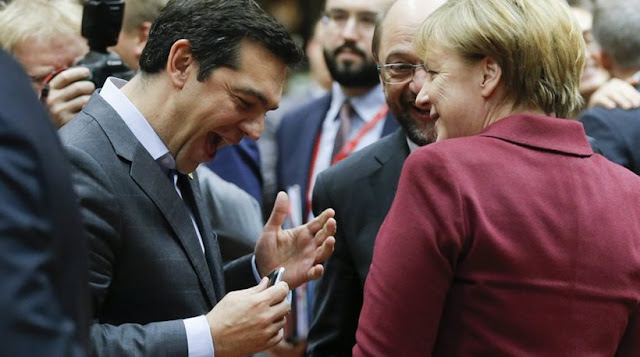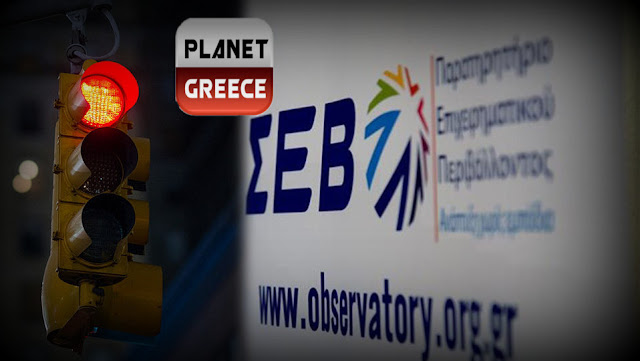Διαβάστε αναλυτικά το τηλεγράφημα
Στο τηλεγράφημα 09FRANKFURT687 το πλησίον αμερικανικό προξενείο της Φρανκφούρτης, όπου εδρεύει η ΕΚΤ, παραθέτει αναλυτικά το τι διημείφθη στην συνάντηση, που σαν κεντρικό της θέμα είχε μία ενδεχόμενη χρεοκοπία της Ελλάδας, την οποία τα στελέχη της ΕΚΤ αρνούνται σε κάθε περίπτωση.
Η αντιπροσωπεία της ΕΚΤ απαντά στις ανησυχίες των εκπροσώπων της αμερικανικής κυβέρνησης ότι όσον αφορά την Ευρωζώνη «υπάρχει αμφιβολία κατά πόσο κάποια από τις προβληματικές οικονομίας (Ελλάδα, Ιταλία, Ισπανία και Πορτογαλία) δεν θα καταφέρουν να εξυπηρετήσουν το χρέος τους».
Ακόμη, οι αξιωματούχοι της Ευρωπαϊκής Κεντρικής τράπεζας σημείωναν στην ίδια συνάντηση του 2009 ότι «η παρούσα κρίση προσφέρει ευκαιρίες για διαρθρωτικές αλλαγές (στις ευρωπαϊκές οικονομίες), οι οποίες έχουν καθυστερήσει εδώ και πάρα πολύ καιρό».
Στις παραπάνω εκτιμήσεις συμφώνησε, όπως περιγράφεται στο ίδιο τηλεγράφημα του Μαρτίου του 2003 και ο επικεφαλής οικονομολόγος της Deutsche Bank, σε ξεχωριστή συνάντηση που είχε με διπλωμάτες του προξενείου.
Αντίθετα, o Ντ. Σουμάχερ της Goldman Sachs φαίνεται να πιστεύει ότι είναι πιθανό να χρεοκοπήσει η Ελλάδα. Μάλιστα, ο άνθρωπος της Goldman προχωράει σε προβλέψεις που αποδείχτηκαν αρκετά ρεαλιστικές τελικά. Οπως αναφέρει το τηλεγράφημα, το στέλεχος της Goldman Sachs βλέπει ως πιθανό το ενδεχόμενο χρεοκοπίας μιας εκ των Ελλάδας, Ιταλίας, Ισπανίας ή Πορτογαλίας, και επισημαίνει ότι «η μέση διάρκεια ωρίμασης του ελληνικού χρέους γινόταν μικρότερη και το υπερτίμημα μεγαλύτερο».
Διαβάστε αναλυτικά το τηλεγράφημα
09FRANKFURT687
| ID : | 196474 |
|---|---|
| RefID : | 09FRANKFURT687 |
| Date : | 12/3/2009 10:14:00 πμ |
| Origin : | Consulate Frankfurt |
| Classification : | UNCLASSIFIED |
- Header :
- VZCZCXRO7354 OO RUEHAG RUEHDF RUEHIK RUEHLZ RUEHROV RUEHSR DE RUEHFT #0687/01 0711014 ZNR UUUUU ZZH O 121014Z MAR 09 FM AMCONSUL FRANKFURT TO RUEHC/SECSTATE WASHDC IMMEDIATE 9896 INFO RUEATRS/DEPT OF TREASURY WASHDC IMMEDIATE RUCNMEM/EU MEMBER STATES IMMEDIATE RUCNFRG/FRG COLLECTIVE IMMEDIATE
UNCLAS SECTION 01 OF 02 FRANKFURT 000687
DEPARTMENT FOR EUR/AGS
SIPDIS
E.O. 12958: N/A
TAGS: EFIN, ECON, EU, GM
SUBJECT: ECB Sees Fiscal Crises in Central and Eastern Europe and
Euro Zone as Manageable
ENTIRE TEXT IS SENSITIVE BUT UNCLASSIFIED. NOT FOR INTERNET
DISTRIBUTION
1. Summary. In a conversation with a Treasury delegation, ECB
officials indicated they could deal with worsening financial turmoil
in Central and Eastern Europe, seeing little chance that crises
there would destabilize the euro zone. They saw a debt default from
a euro zone member such as Greece or Italy as equally unlikely, as
these fiscally troubled countries were still able to service their
debts. In Central and Eastern Europe, they pointed out the large
differences in economic health between countries, stating that only
those that had pursued bad fiscal policy were now facing real
danger. In a separate conversation, a private economist said that a
debt default from a euro zone member was likely and would
necessitate an EU loan that would require more fiscally prudent
members such as Germany and France to offer assistance. End
Summary.
2. On March 5, Treasury Deputy Assistant Secretary Eric Meyer,
Treasury Attache for Europe Matthew Haarsager, Treasury Economist
Lukas Kohler and Congen Econ Off discussed the ECB´s view on
economic stability in Eastern and Central Europe and the euro zone
with the ECB´s Director General for International and European
Relations Frank Moss, Deputy Director for General Economics Philippe
Moutot, and Head of EU Countries Division Klaus Masuch. The
delegation had separate meetings with Deutsche Bank Chief Economist
Norbert Walter and Goldman Sachs Economist Dirk Schumacher.
Eastern and Central Europe Crises Manageable
--------------------------------------------
3. The ECB officials emphasized that one should not look at Central
and Eastern Europe as a single entity, as only certain countries
like Latvia and Hungary were experiencing severe crises due to years
of bad fiscal policy. Others, such as Poland and the Czech
Republic, had kept government debt low and had only small current
account deficits. Moss pointed out these differences were reflected
in markets as seen in varying credit default spreads on government
bonds(a measure of the likelihood of default) and share prices of
local banks. Masuch added that in Western Europe, only Austrian
banks were heavily exposed and that other European governments would
step in if Austria experienced a rash of bank failures, which he
felt was unlikely.
3. The officials also stressed that one needs to differentiate
within Central and Eastern Europe between euro zone members, EU
members, candidate members and non-candidate countries, as the EU´s
framework to help was different in each case. For all countries,
the ECB continued to offer currency swaps to ensure euro liquidity.
Moutot pointed out that some Eastern and Central European economies
had smartly avoided a heavy "euro-ization" of borrowing. The Baltic
states had unwisely fixed their currencies to the euro and then
borrowed heavily in euros, assuming eventual adoption of the
currency. If the currency pegs are abandoned, the euro debt will be
difficult to pay back. The officials argued against accelerated
adoption of the euro in the Baltics, saying that such a move would
not be possible given the current treaty and would only reward bad
decisions.
Euro Zone Should Hold Up
------------------------
4. Turning to the euro zone, the officials doubted that any of the
more troubled economies (Greece, Italy, Spain and Portugal) would be
unable to service their debts and argued that the current crisis
offered the opportunity to enact long-overdue structural reforms and
cut fiscal deficits. The ECB had lowered the minimum accepted
credit rating for government bonds taken as collateral, allowing it
to continue to accept Greek bonds, but the officials admitted any
further downgrading of Greek bonds would create a "tricky"
situation. They pointed out that the ECB´s offer of unlimited
liquidity to the financial sector had worked well so far in
preventing any large bank failure in Europe, unlike in the United
States.
5. Moutot also commented on the recent De Larosiere report on
recommended changes in the EU financial supervisory structure,
saying that it was still not clear how many aspects of the plan
would work in practice. The proposed Systemic Risk Council (ESRC)
chaired by the ECB president would elevate the level of
coordination, but he pointed out that a great deal of coordination
was already in place in the form of the Financial Stability and
Supervision Directorate and the Committee of European Banking
Supervisors. Moutot agreed with the report´s recommendation that
Basel II needed to be revised to reduce "pro-cyclicality" (the idea
that certain regulations could heighten financial risk) but said
that the problem needed to be studied more at the working level as
no one understood it well enough at the moment. On a positive note,
he said that even fiscally responsible euro zone members now had
FRANKFURT 00000687 002 OF 002
developed a deeper appreciation for a coordinated, regional
approach.
The View from the Private Sector
--------------------------------
6. Separately, Deutsche Bank´s Norbert Walter doubted that any euro
zone member would need a bailout, saying Greece was still getting
better terms on its debt than many private companies. Goldman´s
Dirk Schumacher expressed a different opinion, seeing a default in
Greece, Italy, Spain or Portugal as likely and pointing out that the
maturity on Greek debt was getting shorter and the premium higher.
He predicted that in the event of a euro zone member default, the EU
would offer a loan put together by other member nations. In
practice, the loan would be funded primarily by Germany and France,
the only members with current fiscal capability. Germany and France
would demand something in return, namely tax harmonization.
Germany, whose economy is heavily dependent on exports, would have
the unenviable choice between funding a loan or facing a severe blow
to its own economy as its overseas investments and trade sink
further. Funding an EU loan would be politically unpopular in an
election year, and the blame would be shared in the Grand Coalition
by the SPD and CDU.
7. Comment: Although ECB officials remain confident that the fiscal
crises in parts of the euro zone and in Central and Eastern Europe
are manageable, further deterioration in the global economy would
put greater strain on these teetering economies. While the weak
economies will suffer the most, all of the relatively small
economies in Central and Eastern Europe are heavily dependent on the
euro zone for trade and investment. Failure by a fiscally troubled
euro zone member to service its debt would be an even greater and
unprecedented shock to the system that would require a political
agreement among EU member countries to solve. End Comment.
8. This cable was coordinated with Embassy Berlin.
POWELL
;2009-03-12 10:14
DEPARTMENT FOR EUR/AGS
SIPDIS
E.O. 12958: N/A
TAGS: EFIN, ECON, EU, GM
SUBJECT: ECB Sees Fiscal Crises in Central and Eastern Europe and
Euro Zone as Manageable
ENTIRE TEXT IS SENSITIVE BUT UNCLASSIFIED. NOT FOR INTERNET
DISTRIBUTION
1. Summary. In a conversation with a Treasury delegation, ECB
officials indicated they could deal with worsening financial turmoil
in Central and Eastern Europe, seeing little chance that crises
there would destabilize the euro zone. They saw a debt default from
a euro zone member such as Greece or Italy as equally unlikely, as
these fiscally troubled countries were still able to service their
debts. In Central and Eastern Europe, they pointed out the large
differences in economic health between countries, stating that only
those that had pursued bad fiscal policy were now facing real
danger. In a separate conversation, a private economist said that a
debt default from a euro zone member was likely and would
necessitate an EU loan that would require more fiscally prudent
members such as Germany and France to offer assistance. End
Summary.
2. On March 5, Treasury Deputy Assistant Secretary Eric Meyer,
Treasury Attache for Europe Matthew Haarsager, Treasury Economist
Lukas Kohler and Congen Econ Off discussed the ECB´s view on
economic stability in Eastern and Central Europe and the euro zone
with the ECB´s Director General for International and European
Relations Frank Moss, Deputy Director for General Economics Philippe
Moutot, and Head of EU Countries Division Klaus Masuch. The
delegation had separate meetings with Deutsche Bank Chief Economist
Norbert Walter and Goldman Sachs Economist Dirk Schumacher.
Eastern and Central Europe Crises Manageable
--------------------------------------------
3. The ECB officials emphasized that one should not look at Central
and Eastern Europe as a single entity, as only certain countries
like Latvia and Hungary were experiencing severe crises due to years
of bad fiscal policy. Others, such as Poland and the Czech
Republic, had kept government debt low and had only small current
account deficits. Moss pointed out these differences were reflected
in markets as seen in varying credit default spreads on government
bonds(a measure of the likelihood of default) and share prices of
local banks. Masuch added that in Western Europe, only Austrian
banks were heavily exposed and that other European governments would
step in if Austria experienced a rash of bank failures, which he
felt was unlikely.
3. The officials also stressed that one needs to differentiate
within Central and Eastern Europe between euro zone members, EU
members, candidate members and non-candidate countries, as the EU´s
framework to help was different in each case. For all countries,
the ECB continued to offer currency swaps to ensure euro liquidity.
Moutot pointed out that some Eastern and Central European economies
had smartly avoided a heavy "euro-ization" of borrowing. The Baltic
states had unwisely fixed their currencies to the euro and then
borrowed heavily in euros, assuming eventual adoption of the
currency. If the currency pegs are abandoned, the euro debt will be
difficult to pay back. The officials argued against accelerated
adoption of the euro in the Baltics, saying that such a move would
not be possible given the current treaty and would only reward bad
decisions.
Euro Zone Should Hold Up
------------------------
4. Turning to the euro zone, the officials doubted that any of the
more troubled economies (Greece, Italy, Spain and Portugal) would be
unable to service their debts and argued that the current crisis
offered the opportunity to enact long-overdue structural reforms and
cut fiscal deficits. The ECB had lowered the minimum accepted
credit rating for government bonds taken as collateral, allowing it
to continue to accept Greek bonds, but the officials admitted any
further downgrading of Greek bonds would create a "tricky"
situation. They pointed out that the ECB´s offer of unlimited
liquidity to the financial sector had worked well so far in
preventing any large bank failure in Europe, unlike in the United
States.
5. Moutot also commented on the recent De Larosiere report on
recommended changes in the EU financial supervisory structure,
saying that it was still not clear how many aspects of the plan
would work in practice. The proposed Systemic Risk Council (ESRC)
chaired by the ECB president would elevate the level of
coordination, but he pointed out that a great deal of coordination
was already in place in the form of the Financial Stability and
Supervision Directorate and the Committee of European Banking
Supervisors. Moutot agreed with the report´s recommendation that
Basel II needed to be revised to reduce "pro-cyclicality" (the idea
that certain regulations could heighten financial risk) but said
that the problem needed to be studied more at the working level as
no one understood it well enough at the moment. On a positive note,
he said that even fiscally responsible euro zone members now had
FRANKFURT 00000687 002 OF 002
developed a deeper appreciation for a coordinated, regional
approach.
The View from the Private Sector
--------------------------------
6. Separately, Deutsche Bank´s Norbert Walter doubted that any euro
zone member would need a bailout, saying Greece was still getting
better terms on its debt than many private companies. Goldman´s
Dirk Schumacher expressed a different opinion, seeing a default in
Greece, Italy, Spain or Portugal as likely and pointing out that the
maturity on Greek debt was getting shorter and the premium higher.
He predicted that in the event of a euro zone member default, the EU
would offer a loan put together by other member nations. In
practice, the loan would be funded primarily by Germany and France,
the only members with current fiscal capability. Germany and France
would demand something in return, namely tax harmonization.
Germany, whose economy is heavily dependent on exports, would have
the unenviable choice between funding a loan or facing a severe blow
to its own economy as its overseas investments and trade sink
further. Funding an EU loan would be politically unpopular in an
election year, and the blame would be shared in the Grand Coalition
by the SPD and CDU.
7. Comment: Although ECB officials remain confident that the fiscal
crises in parts of the euro zone and in Central and Eastern Europe
are manageable, further deterioration in the global economy would
put greater strain on these teetering economies. While the weak
economies will suffer the most, all of the relatively small
economies in Central and Eastern Europe are heavily dependent on the
euro zone for trade and investment. Failure by a fiscally troubled
euro zone member to service its debt would be an even greater and
unprecedented shock to the system that would require a political
agreement among EU member countries to solve. End Comment.
8. This cable was coordinated with Embassy Berlin.
POWELL
;2009-03-12 10:14
πηγή: "νέοι Φάκελοι", Καθημερινή









Δεν υπάρχουν σχόλια:
Δημοσίευση σχολίου
Για να αποφευχθούν περιπτώσεις εμφάνισης υβριστικών σχολίων ή άλλων ποινικά κολάσιμων πράξεων, όλα τα σχόλια πριν δημοσιευτούν ελέγχονται.
Παρακαλούμε μην αποστέλετε πληροφορίες άχρηστες προς τη λειτουργία του συγκεκριμένου blog.
Τα μηνύματα είναι προσωπικές απόψεις των αποστολέων και σε καμία περίπτωση δεν εκφράζουν τους δημιουργούς ή διαχειριστές της συγκεκριμένης σελίδας.